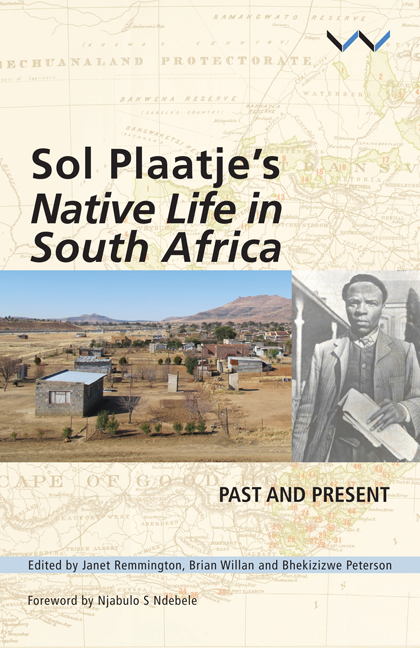Book contents
- Frontmatter
- Table of Contents
- Acknowledgements
- Foreword: Sol T Plaatje and the ‘power of all’
- Introduction: Native Life in South Africa – then and now
- Editions of Native Life in South Africa: 1916 to the present
- Looking Back: Foreword to Ravan Press edition of Native Life in South Africa, 1982
- Poetic Tributes
- What is in a name? In memory of Sol T Plaatje
- Segopoco Sa Moshui Sol T Plaatje
- In memory of the late Sol T Plaatje
- Lefatshe, nkometse
- Earth, swallow me
- Miscellaneous Frontmatter
- Chapter 1 Native Life in South Africa: Writing, publication, reception
- Chapter 2 Modernist at large: The aesthetics of Native Life in South Africa
- Chapter 3 The print world of the press and Native Life in South Africa
- Chapter 4 Going places: Native Life in South Africa and the politics of mobility
- Chapter 5 Native Life in South Africa and the world at war
- Chapter 6 African intellectual history, black cosmopolitanism and Native Life in South Africa
- Chapter 7 ‘Native Lives’ behind Native Life: Intellectual and political influences on the ANC and democratic South Africa
- Chapter 8 Whose past? Native Life in South Africa and historical writing
- Chapter 9 Women and society in Native Life in South Africa: Roles and ruptures
- Chapter 10 African progressivism, land and law: Re-reading Native Life in South Africa
- Chapter 11 Land and belonging: On the tomb ya ga Solomon Plaatje
- Chapter 12 Revisiting the landscapes of Native Life
- A Contemporary Reimagining: The Road to Dikhudung
- Contributors
- Plaatje Resources
- List of Figures
- Index
Chapter 4 - Going places: Native Life in South Africa and the politics of mobility
from Poetic Tributes
Published online by Cambridge University Press: 21 April 2018
- Frontmatter
- Table of Contents
- Acknowledgements
- Foreword: Sol T Plaatje and the ‘power of all’
- Introduction: Native Life in South Africa – then and now
- Editions of Native Life in South Africa: 1916 to the present
- Looking Back: Foreword to Ravan Press edition of Native Life in South Africa, 1982
- Poetic Tributes
- What is in a name? In memory of Sol T Plaatje
- Segopoco Sa Moshui Sol T Plaatje
- In memory of the late Sol T Plaatje
- Lefatshe, nkometse
- Earth, swallow me
- Miscellaneous Frontmatter
- Chapter 1 Native Life in South Africa: Writing, publication, reception
- Chapter 2 Modernist at large: The aesthetics of Native Life in South Africa
- Chapter 3 The print world of the press and Native Life in South Africa
- Chapter 4 Going places: Native Life in South Africa and the politics of mobility
- Chapter 5 Native Life in South Africa and the world at war
- Chapter 6 African intellectual history, black cosmopolitanism and Native Life in South Africa
- Chapter 7 ‘Native Lives’ behind Native Life: Intellectual and political influences on the ANC and democratic South Africa
- Chapter 8 Whose past? Native Life in South Africa and historical writing
- Chapter 9 Women and society in Native Life in South Africa: Roles and ruptures
- Chapter 10 African progressivism, land and law: Re-reading Native Life in South Africa
- Chapter 11 Land and belonging: On the tomb ya ga Solomon Plaatje
- Chapter 12 Revisiting the landscapes of Native Life
- A Contemporary Reimagining: The Road to Dikhudung
- Contributors
- Plaatje Resources
- List of Figures
- Index
Summary
Have you not observed that [birds] are of different colours and yet are not restricted in their flight on that account; and are you going to run counter to the work of nature in regard to human beings?
The freedom to move – and to settle – are fundamental entitlements, amounting to laws of nature. Such is the character of Sol Plaatje's assertions in Native Life in South Africa. What can have more imaginative capital than birds of different kinds catching the wind, determining their courses and destinations? In the epigraph above, Plaatje quotes a fellow black imperial subject, the Guyanese barrister S S A Cambridge, in his appeal for racial justice in early twentieth-century South Africa, not least in light of the discriminatory 1913 Natives’ Land Act. Plaatje boldly invokes avian flight, symbolic of the utopic scope of unquestioned mobility, to help fuel a political imaginary: people ‘of different colours’ unhindered in their comings and goings in the land, empire, world of which they are part.
Struggles over power in South Africa have long been expressed in terms of racialised control over exercise of movement. This reality forms a backdrop to and an originating impetus for this essay. South African history is replete with examples of black mobility being forced, induced, restricted, limited, policed, questioned. Manifestations include the systematic displacement of nomadic herders and hunter gatherers; the attribution of ‘vagrancy’ to those who wished to escape indentured labour or to move about at will; border ‘buffers’ between white and black; ‘passes’ for people of colour; designation of reserves, which in expanded and modified form, became the basis for euphemistically-termed ‘homelands’ during high apartheid; regulation of migrant labour and ‘influx control’ into cities; forced removals; one-way exit visas; anti-black immigration policies. The politicised nature of movement is of course not unique to South Africa, but the racialised, pronounced and enduring nature of mobility controls and pressures in all their variety present themselves as significant factors in the country's past, with telling spatial and sociopolitical implications for the present and future. Power struggles in South Africa have also long been played out in the field of cultural and literary production.
- Type
- Chapter
- Information
- Sol Plaatje's Native Life in South AfricaPast and Present, pp. 54 - 80Publisher: Wits University PressPrint publication year: 2016



